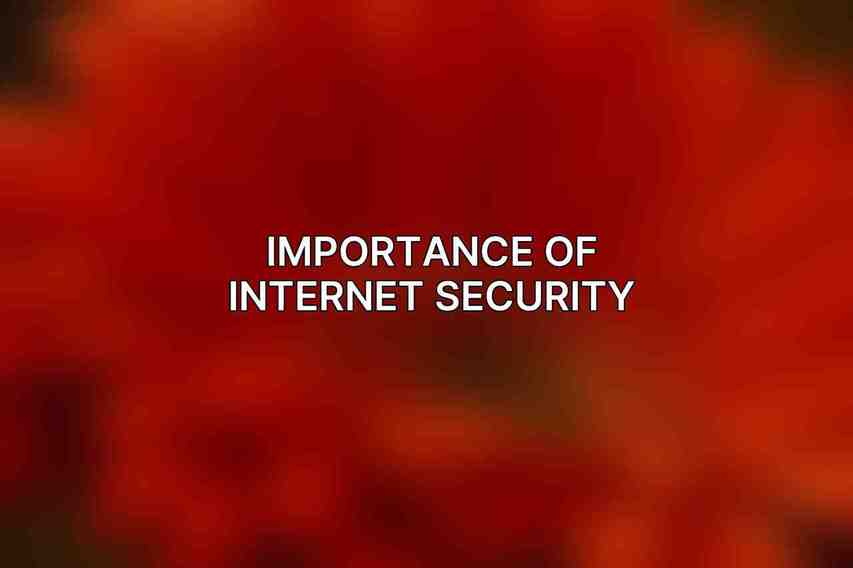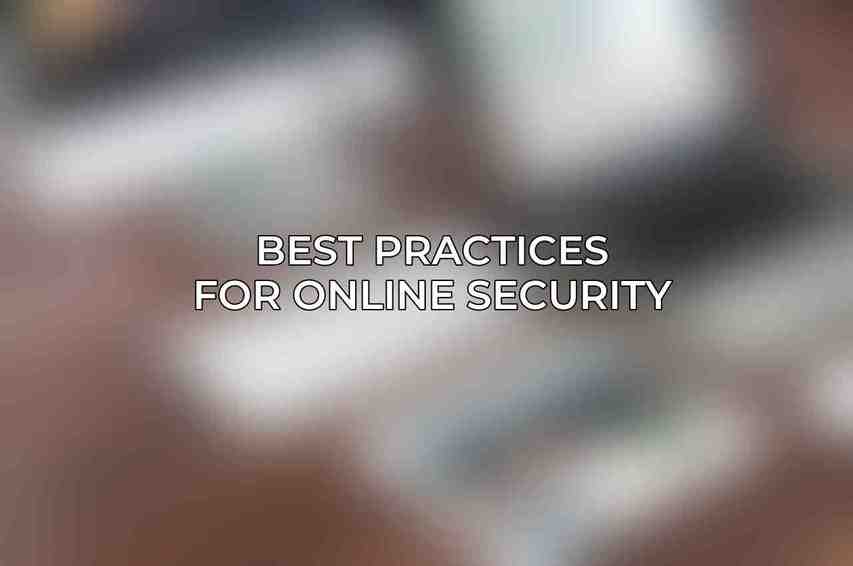The importance of internet security cannot be overstated. as individuals and businesses alike rely more on online platforms for communication, transactions, and data storage, the need to safeguard sensitive information from potential cyber threats has become paramount. Understanding the fundamental principles of internet security is crucial to navigating the digital world safely and securely.
Importance of Internet Security

Internet security is essential to protect personal information, financial data, and privacy in an interconnected world where cyber threats are prevalent. Without adequate security measures in place, individuals and organizations are vulnerable to a range of online risks, including data breaches, identity theft, malware infections, and phishing scams.
Potential Risks and Threats Faced Online
The internet is filled with threats that can compromise the security of devices and networks. Cybercriminals use various tactics such as malware, phishing, ransomware, and social engineering to exploit vulnerabilities and gain unauthorized access to sensitive information. Understanding these risks is the first step towards implementing effective security practices.
Overview of Essential Security Practices
To mitigate the risks associated with online activities, individuals need to adopt a proactive approach to internet security. This includes implementing strong passwords, using antivirus software, configuring firewalls, securing emails, and practicing safe browsing habits. By following these essential security practices, users can significantly reduce the likelihood of falling victim to cyber threats.
Essential Internet Security Principles:
Strong Passwords
Creating complex passwords that are unique for each account is crucial in preventing unauthorized access to sensitive information. Utilizing password managers can help users generate and store strong passwords securely. You can find more information on Top Antivirus Software of the Year: Expert Picks
Antivirus and Anti-malware Software
Antivirus software plays a vital role in detecting and removing malicious software from devices. Regularly updating antivirus programs ensures that the latest threats are identified and neutralized.
Firewall Protection
Firewalls act as a barrier between a device or network and potential threats from the internet. Understanding the differences between hardware and software firewalls and configuring them correctly enhances overall security. Read more on Encryption Explained: Securing Your Online Data
Email Security
Emails are a common vector for cyber attacks, including phishing attempts and malware distribution. Educating users on how to recognize suspicious emails, avoid spam, and practice secure email habits is essential for protecting sensitive information.
Best Practices for Online Security:

Secure Browsing Habits
Adopting secure browsing habits involves verifying website authenticity, avoiding clicking on suspicious links, and refraining from downloading unknown files. By sticking to reputable websites, users can reduce the risk of malware infections and phishing attacks. You can find more information on Creating Strong Passwords: Your Ultimate Guide
Social Media Security
Securing social media accounts through privacy settings, limiting the sharing of personal information, and being cautious about accepting friend requests from unknown individuals are key practices for maintaining online privacy and security.
Mobile Device Security
Mobile devices are susceptible to security breaches due to their portability and constant connectivity. Implementing strong passwords, using security apps, and refraining from connecting to unsecured Wi-Fi networks are essential precautions for safeguarding mobile data.
Online Shopping Security
When making online purchases, it’s essential to use secure payment gateways, verify the legitimacy of websites, and monitor bank statements for any unauthorized transactions. Being vigilant during online transactions can prevent financial fraud and identity theft.
Advanced Internet Security Measures:
Virtual Private Networks (VPNs)
VPNs provide an additional layer of security by encrypting internet traffic and masking users’ IP addresses. Choosing a reputable VPN provider and understanding how VPNs work can help users safeguard their online activities from prying eyes.
Two-Factor Authentication
Enabling two-factor authentication adds an extra security step beyond passwords, requiring users to provide a secondary form of verification to access accounts. By utilizing two-factor authentication, individuals can significantly enhance the security of their online accounts. Explore further with Safe Browsing Practices to Protect Your Online Privacy
Cloud Security
Ensuring its protection is crucial. implementing robust security measures, such as data encryption, access controls, and regular audits, can help safeguard sensitive information stored in cloud services.
Staying Up-to-Date with Internet Security:
Security Patches and Updates
Regularly updating software, operating systems, and security patches is essential for addressing known vulnerabilities and exploits. By staying proactive in updating devices and applications, users can protect themselves against emerging threats.
Keeping Informed About New Threats
Education is key to staying ahead of cyber threats. Reading security blogs, following cybersecurity experts on social media, and staying informed about the latest trends in online security can empower individuals to make informed decisions and protect themselves online.
Communicating with IT Professionals
In situations where users encounter security concerns they are unsure how to handle, seeking guidance from IT professionals can provide valuable insights and assistance. Reporting security incidents promptly to IT support can help mitigate potential risks and prevent further harm.
Recap of Key Internet Security Principles and Practices
understanding and implementing essential internet security principles such as strong passwords, antivirus software, firewalls, and secure browsing habits are crucial for safeguarding personal and sensitive information online. By following best practices and staying informed about advanced security measures, individuals can enhance their digital security posture and protect themselves from cyber threats.
Importance of Ongoing Vigilance and Proactive Measures
Internet security is an ongoing process that requires continuous vigilance and proactive measures to adapt to evolving threats. By staying proactive, educating oneself, and implementing security best practices, individuals can reduce their vulnerability to cyber attacks and maintain a safer online presence.
Empowerment Through Knowledge and Awareness
Empowering individuals with knowledge and awareness about internet security enables them to navigate the digital world confidently and securely. By equipping themselves with the necessary tools and information, users can take control of their online security and protect their digital assets effectively.
prioritizing internet security is essential in this interconnected world. By understanding the basics of internet security, adopting best practices, and staying informed about the latest threats and trends, individuals can safeguard their online activities and ensure a safer digital experience. Remember, vigilance and proactive measures are key to staying one step ahead of cyber threats.
Frequently Asked Questions
What is Internet security?
Internet security refers to the measures taken to protect data while it is being sent or received over the internet.
Why is internet security important?
Internet security is important as it helps prevent unauthorized access to personal or sensitive information and safeguards against cyber attacks.
What are common threats to internet security?
Common threats to internet security include malware, phishing, ransomware, and man-in-the-middle attacks.
How can I improve my internet security?
To improve internet security, you can use strong, unique passwords, keep your software updated, enable two-factor authentication, and be cautious of suspicious links or emails.
What should I do if I think my internet security has been compromised?
If you suspect a breach in your internet security, you should immediately change your passwords, run antivirus scans on your devices, and report any suspicious activity to your internet service provider.

